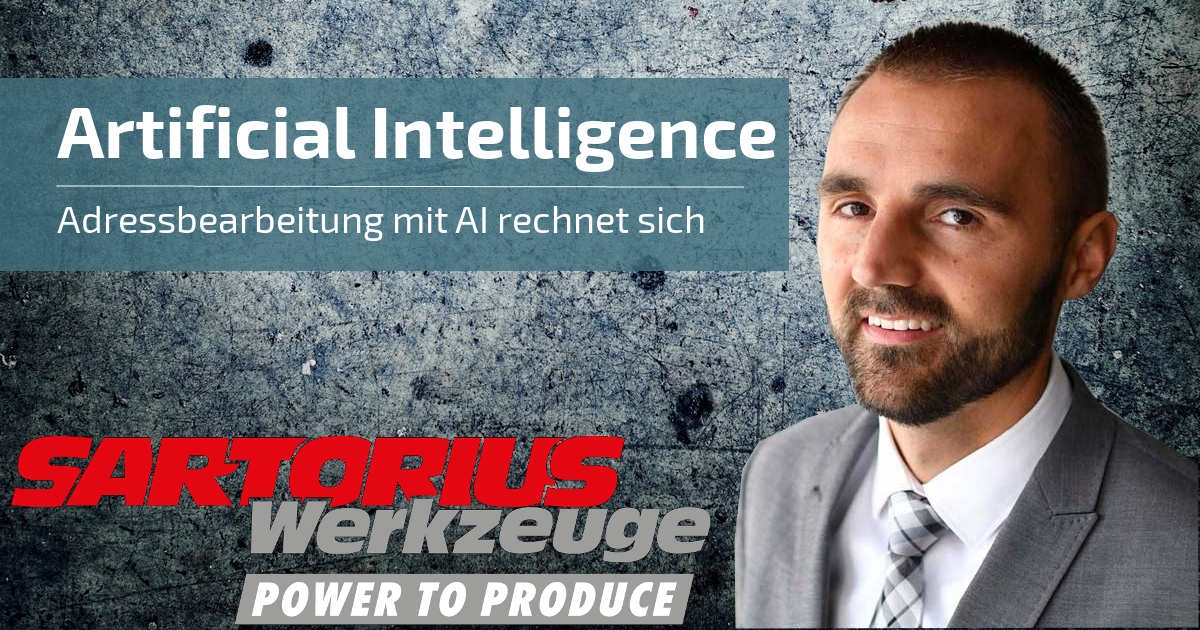
Sartorius Tools: Address-processing with AI (Artificial Intelligence) pays off
Sartorius Werkzeuge GmbH & Co. KG uses an AI-based customer value prediction software developed by Dastani Consulting to manage its sales force activities. We asked their managing director, Ivica Pavlinusic, how the sales function applies the principle of customer value and what benefits this brings.
Predictive Analytics Blog: In the current catalogue you offer more than 49,000 articles relating to machine tools. How does a B2B sales organisation such as Sartorius Werkzeuge reach its buyers?
Ivica Pavlinusic: As a trading company with many suppliers’ brands and two strong own brands, we are a thoroughly sales-driven organisation. We operate in a mass market that is characterised by very strong predatory competition. The market consists of many micro-enterprises – contract manufacturers with a maximum of five to ten employees – as well as medium-sized companies. This incurs a lot of running around coupled with moderate earnings plus a high level of administration to keep track of potential customers. Of our 80 sales employees, nearly 70 make up the field sales force.
Predictive Analytics Blog: How do you keep the salesforce supplied with leads?
Ivica Pavlinusic: Our almost 70 field staff use an app developed by Dastani Consulting, which shows them a list of the potential customers in their area. The more likely they are to buy, the higher they are positioned in the list. You have just mentioned the breadth of our product offering; this is where the app also helps, and what I think is at least as helpful is that our salesman receives a recommendation as to the products most likely to be of interest to the respective customer.
Predictive Analytics Blog: Which technology is involved in this?
Ivica Pavlinusic: Algorithms use AI (Artificial Intelligence) to calculate the value of each individual customer. The software learns from the data and from the effectiveness of the projections. On the other hand, the quality of our sales effort increases as our salesmen become more familiar with the app and are able to firmly integrate it into their daily work routine.
Predictive Analytics Blog: What is the real benefit? Can it be expressed in figures?
Ivica Pavlinusic: What really surprised us was the positive effect on our business with existing customers. Thanks to preselection using the Customer Value Prediction software, the share of potential customers rose to 70%! We had simply underrated the significance of many of our customers over the past years. By realigning our turnover expectation to the potential and acting accordingly, we were able to make significant gains.
Predictive Analytics Blog: And what about new customers?
Ivica Pavlinusic: The potential arising from purchased addresses is normally around 10%. One can now say that AI-based customer value prediction has an appreciable effect, resulting in more than half the relevant companies displaying a level of affinity.
Predictive Analytics Blog: An individual development in the form of software-as-a-service doesn’t necessarily pay off. What is your view of the cost-benefit effect of the Dastani project?
Ivica Pavlinusic: It depends on the sales method. Direct sales, which is a vital channel for us, is the most expensive form. Every instance of avoiding an unsuccessful customer visit pays off for Sartorius, as does every visit where we have recognised the potential early enough to get in first before the competition. Dastani Consulting’s approach is exactly what we need – the team is very well-versed not only in sales matters but also data analysis. Working together, we were soon able to identify where to start. The project remained within the projected timing and cost framework and is entirely pragmatic. The cost-benefit effect is quite acceptable for Sartorius. I would go so far as to say that in the long run, no sales organisation comparable to ours will be able to do without digital and AI-based address processing.
